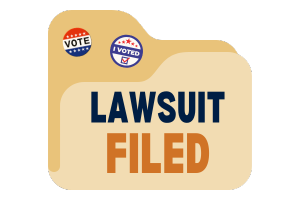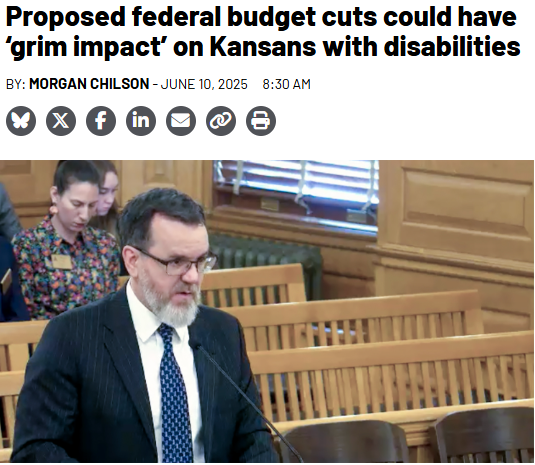DRC Newsletter - June 2025
LAWSUIT FILED: Pro-Voting Organizations File Lawsuit Challenging Ballot Receipt Deadline Restriction
On May 5th, the Disability Rights Center of Kansas (DRC), Kansas Appleseed Center for Law and Justice, and Loud Light signed on as plaintiffs to a pro-voting lawsuit challenging Senate Bill 4. Senate Bill 4 is a new law that eliminates the three-day grace period for mail ballot returns, a change that would disenfranchise thousands of Kansans who vote by mail. This includes, but is not limited to, Kansans with disabilities who vote by mail in every election with a permanent advanced ballot.
Given how slow the U.S. Postal Service was prior to the recent cutbacks, and how the cutbacks have only made things worse, this change in law will ensure that many legitimate votes will never be counted in Kansas, simply due to post office delays. It is essential to note that ALL Kansas mail is processed outside of Kansas, which further delays its delivery.
To qualify for a permanent advanced ballot, a Kansan must be a person with a disability and disclose their disability on the application. That means this new law will disproportionately disenfranchise Kansans with disabilities and harm their ability to have their vote count.
Read the full statement and learn more about the case here.
_________________________________________________________
Critical Kansas Disability Services Are at Risk – Disability Rights Services Targeted for Upwards of 62% Cut!
The President's proposed budget seriously threatens disability programs nationwide, including targeting upwards of a 62% cut to Protection and Advocacy (P&A) agencies like DRC. When these cuts are combined with the proposed Medicaid cuts in the reconciliation bill in Congress, the results would be horrible for individuals with disabilities.
P&As are the only independent watchdogs protecting the disability rights of Americans with disabilities. P&As have special powers under federal law to investigate abuse and neglect of people with disabilities and to hold the perpetrators of the abuse and neglect accountable for their actions. If enacted, this 62% cut to P&As would gut DRC’s ability to conduct unannounced facility visits, investigate abuse and neglect, and help Kansans fight for basic disability rights through its free legal and advocacy services.
P&As also help Americans with disabilities navigate complex Medicaid programs and represent them to overturn individual cuts in Medicaid services and supports. Combining the proposed Medicaid and P&A cuts is an “unfortunate double whammy that will greatly harm Americans with disabilities,” said DRC Executive Director Rocky Nichols.
Nationwide, P&A programs protect the disability rights of millions of Americans with disabilities. The 62% cut would have devastating consequences. Learn what's at stake and why we must act now in the article linked here.
Note: after the Kansas Reflector published its story, new details about the President’s proposed budget were released. The new details show P&As, like DRC, having a total reduction of upwards of 62% in federal funding. When the article was first written, the best information publicly available showed the total P&A cuts ranged from 68% to 87% (because the cuts were based on a leaked HHS budget at the time, whereas the official President’s budget details have since been released).
_________________________________________________________
Consider Donating to DRC Today - Help Us Fight the Threats to Disability Services!
Given the significant threats to funding for DRC—and broader attacks on people with disabilities, including devastating Medicaid cuts that would strip services from millions—would you please consider donating to DRC today? Any gift is greatly appreciated and will help DRC respond to these threats and provide more legally-based advocacy services to Kansans with disabilities. DRC is a 501(c)(3) non-profit corporation, and your donation is tax-deductible. Thank you for your support!
__________________________________________________________
Celebrating 26 Years of Olmstead
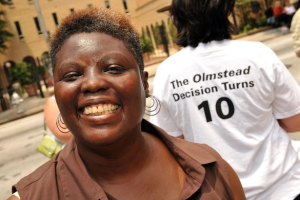
June 22nd marks the 26th anniversary of the landmark Olmstead v. L.C. decision, which affirmed the right of people with disabilities to live and receive services in the most integrated setting. The U.S. Supreme Court held that unnecessary institutionalization is discrimination under the Americans with Disabilities Act. This landmark decision has enabled seniors and individuals with disabilities to live in their own homes, thereby better ensuring they receive proper community-based supports.
The courage of plaintiffs Lois Curtis and Elaine Wilson transformed how the U.S. approaches disability rights, paving the way for many people to transition from institutional settings to community-based living, including in their own homes.
As we celebrate this significant milestone 26 years later, we also acknowledge that far too many people who want to live in the community remain stuck in institutions due to a lack of access to the home and community-based services they need or waitlists for those services. The fight continues to make Olmstead a reality for all.
DRC successfully obtained a landmark settlement agreement with the state of Kansas enforcing Olmstead rights to help Kansans languishing in Nursing Facilities for Mental Health to transition to integrated housing in the community with the proper support. Find out more about it here.
Community Integration Success Stories
Client Story:*Daniel is a 33-year-old Kansan with autism and an intellectual disability. He is also nonverbal. When Daniel's managed care organization (MCO) attempted to drastically cut his I/DD waiver supportive home care hours from 69 to 31 hours per week, his mother reached out to DRC for help. A DRC attorney appealed the decision and successfully represented Daniel at a judicial hearing. As a result, 60 hours per week were reinstated, which was an outcome Daniel's mother said would meet his needs. Daniel was able to maintain his independence at home, thanks to the outcome of the fair hearing. *Client's name changed to maintain confidentiality.
Client Story: *Betty is a 41-year-old with a neurological condition that causes chronic weakness, fatigue, and other debilitating issues. She reached out to DRC for help discharging from the nursing facility she was living in to move to a more inclusive environment. She wanted to live more independently and be closer to her children. A DRC advocate worked with Betty's MCO care coordinator to explore community-based services. Betty was ultimately approved for the Physical Disability Home and Community Based Services (HCBS) Waiver program, and transitioned to an assisted living facility closer to her children. *Client's name changed to maintain confidentiality.
DRC is proud of the work our advocates and attorneys do to carry forward the legacy of the Olmstead decision, fighting for Kansans to have real choices and opportunities to live, work, and thrive in their communities.
_________________________________________________________
The Protection and Advocacy System and DRC's Impact
DRC is part of the Protection and Advocacy (P&A) system. What is the P&A system? It was created by Congress in 1975 and is enshrined in federal law. Each U.S. state and territory has a designated P&A agency to protect the rights of individuals with disabilities. DRC is the official P&A agency for Kansans with disabilities. As the P&A, DRC has a federal mandate to help keep people with disabilities safe from abuse and neglect, fight illegal discrimination, and ensure the protection of their right to healthcare, housing, jobs, and education.
In Federal Fiscal Year 2024 alone, DRC's advocates and attorneys provided 2,045 legally-based services, including legal representation, to Kansans with disabilities through our P&A program and our Disability and Aging Crime Victims Unit (DACVU) program.
DRC served clients within the Priority areas listed below. We list the percentage of services provided for each issue area or program. Our priorities are chosen with the consideration of feedback we receive from disability community members like YOU! For Federal Fiscal Year 2025, we received 905 responses to our annual public feedback survey. Thank you for your participation!
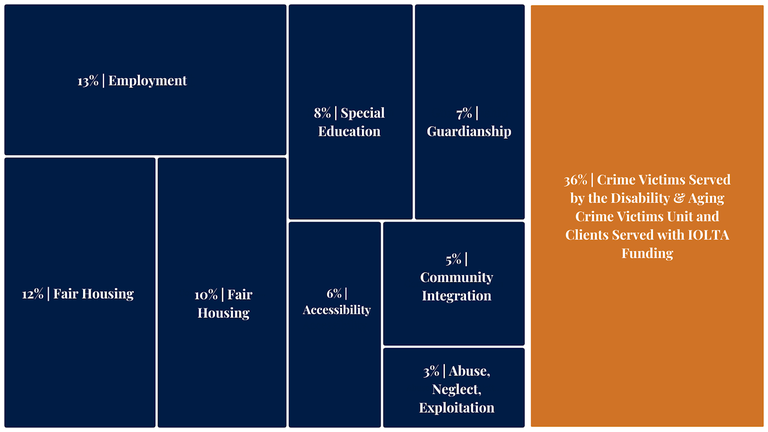
13% | Employment, 12% | Fair Housing, 8% | Special Education, 7% | Guardianship, 6% | Accessibility, 5% | Community Integration, 3% | Abuse, Neglect, Exploitation, 36% | Crime Victims Served by the Disability & Aging Crime Victims Unit (DACVU) and Clients Served with IOLTA Funds
__________________________________________________________
Providing Support to a Victim of Stalking
Client Story: *Brianna is a young woman with a physical disability who works in customer service at a retail store. A customer at the store began stalking Brianna, sexually harassing her while she worked, and following her into the parking lot. Brianna contacted DRC for help.
An attorney with DRC's Disability & Aging Crime Victims Unit (DACU) team represented her at a Protection from Stalking (PFS) court proceeding and obtained a 2-year protection order against her stalker.
Brianna testified at the trial and strongly advocated for herself.
She spoke about how the stalking made her feel unsafe as a woman and as a person with a disability. Her bravery not only helped her get the protection she needed, but also helped educate the stalker about the harm his actions caused.
1 in 3 women and 1 in 6 men experience stalking at some point in their lifetime. If you are experiencing stalking, know that it is not your fault. You are not alone. If you are in need of resources about stalking, check out the Stalking Prevention, Awareness & Resource Center (SPARC) for details on what stalking behavior is and what you can do to stop it.
If you are a person with a disability who has been the victim of a crime, like stalking, the DACVU team is here to help. Contact us by phone toll-free at 1-877-776-1541 or online at drckansas.org/get-help
*Client name changed to protect client's confidentiality.
__________________________________________________________
Summer Fun: Free Lifetime Pass to Visit National Parks

Did you know that Americans with disabilities are eligible for a free, lifetime pass to visit National Parks and Federal Recreational Lands? It's called an “Access Pass" and it can be used at over 2000 Federal recreation sites, including National Parks, National Wildlife Refuges, National Forests, and other federal recreation lands!
Not only does the pass cover the person with a disability, it includes any passengers traveling in the same vehicle, or the pass owner and three additional adults where per-person fees are charged.
Find out more about how you can qualify here.
__________________________________________________________
DRC is Here to Help
DRC has attorneys and advocates who provide free advocacy and legal services for disability rights. We help with many different disability rights issues. Additionally, our Disability & Aging Crime Victims Unit (DACVU) helps both Kansans with disabilities and Kansas seniors who have been victims of crime. Need assistance? Contact us today.
Get Help
_________________________________________________________
More Resources
Have you visited the Resource Center on DRC's website? The Resource Center has lots of information and tools to advocate for your disability rights. There is information on topics like Assistive Technology, Special Education, Employment, Alternatives to Guardianship, Social Security, and more.
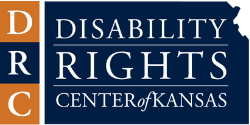.png)







